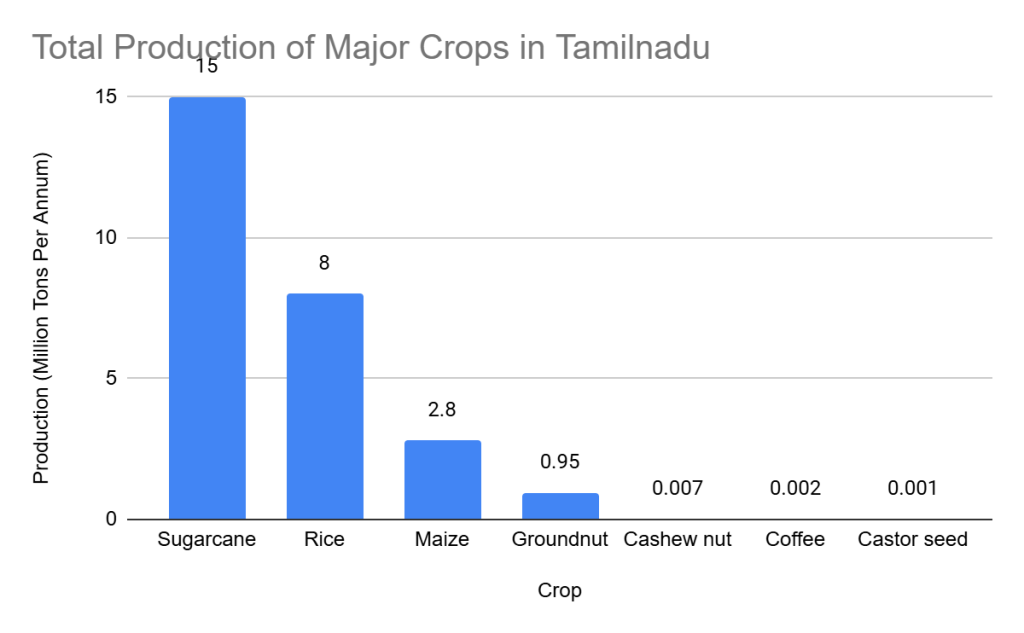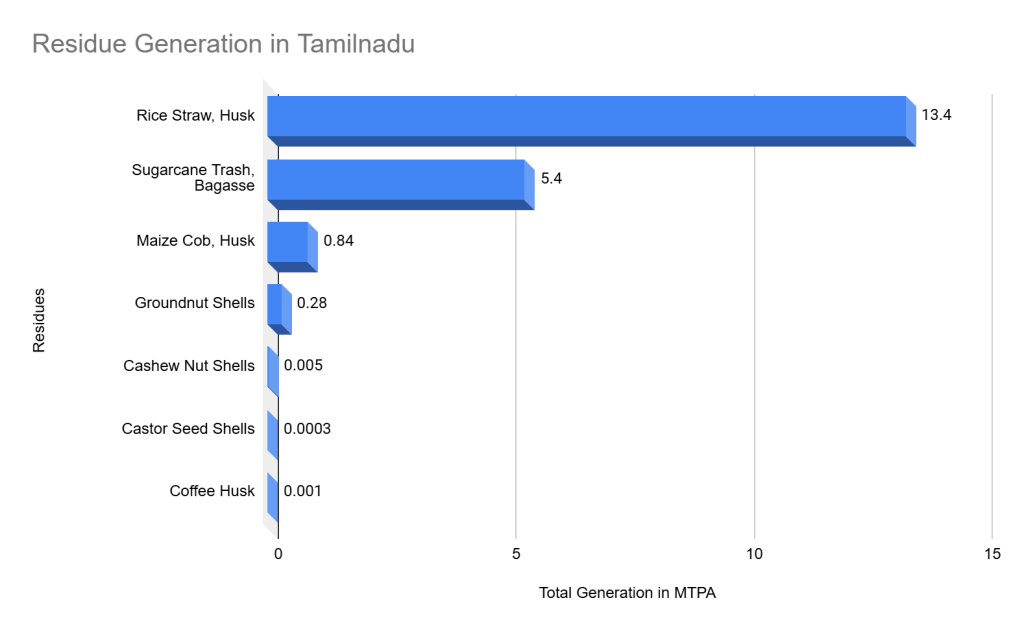
Key Questions Answered in this Section
- What are the major crops contributing to biomass feedstock production in Tamil Nadu?
- Which regions in Tamil Nadu are known for cultivation of prominent crops?
- Which types of biomass residues are generated in Tamil Nadu?
- What are the biomass clusters in Tamil Nadu?
- How is the biomass supply chain in Tamil Nadu?
- How much rice straw is generated in Tamil Nadu?
- How much rice husk is generated in Tamil Nadu?
- How much sugarcane trash and bagasse is generated in Tamil Nadu?
- How much maize cob and husk is generated in Tamil Nadu?
- How much groundnut shells is generated in Tamil Nadu?
- How much cashew nut shells is generated in Tamil Nadu?
- How much castor seed shells is generated in Tamil Nadu?
- How much coffee husk is generated in Tamil Nadu?
Tamil Nadu comprises a mix of urban and rural regions, with the top urban areas being Chennai, Coimbatore, Madurai, Tiruchirappalli, Salem, Tirunelveli, Tiruppur, Erode, Vellore, and Thoothukudi. Understanding the biomass supply chain in Tamil Nadu is crucial for optimizing the utilization of agri residues and enhancing the state’s bioenergy potential.
Expert Consulting Assistance for Indian Bioenergy & Biomaterials
Talk to BioBiz
Call Muthu – 9952910083
Email – ask@biobiz.in
Major Crops Grown in Tamil Nadu
The crops associated with biomass feedstock generation in Tamil Nadu include:
| Crop | Total Production (MTPA) |
| Sugarcane | 15 |
| Rice | 8 |
| Maize | 2.8 |
| Groundnut | 0.95 |
| Cashew nut | 0.007 |
| Coffee | 0.002 |
| Castor seed | 0.001 |

The cultivation of these crops results in substantial biomass feedstock, contributing significantly to Tamil Nadu’s bioeconomy.
Residue Generation in Tamil Nadu
For each crop, the total residue generation data is as follows:
| Crop | Residue Type | Quantity (MTPA) |
| Rice | Straw, husk | 13.4 |
| Sugarcane | Trash, Bagasse | 5.4 |
| Maize | Cob, Husk | 0.84 |
| Groundnut | Shells | 0.28 |
| Cashew nut | Shells | 0.005 |
| Castor Seed | Shells | 0.0003 |
| Coffee | Husk | 0.001 |

Efficient management of these crop residues is essential for developing a sustainable biomass supply chain in Tamil Nadu.
Significant Regions of Availability in Tamil Nadu
Regions in Tamil Nadu with significant availability of crop residues:
- Rice: Thanjavur, Tiruvarur, Nagapattinam
- Sugarcane: Tiruchirappalli, Perambalur, Karur, Salem, Namakkal, Coimbatore, Dharmapuri, Cuddalore
- Maize: Perambalur, Salem, Dindigul, Madurai, Tiruppur, Ariyalur, Namakkal, Pudukottai, and Villuppuram
- Cashew: Theni, Villupuram, Sivagangai, Pudukkottai, Ariyalur, Cuddalore
- Groundnut: Panruti, Salem, Coimbatore
- Cotton: Coimbatore, Salem, Tiruppur
Identifying these biomass clusters enables targeted strategies for biomass feedstock collection and utilization.
Prominent Crops in Different Regions of Tamilnadu
Each region’s unique crop profile contributes to the diversity of agricultural residues, impacting the overall biomass availability in Tamil Nadu.
| Region | Prominent Crops |
| Thanjavur | Rice |
| Tiruvarur | Rice |
| Nagapattinam | Rice |
| Tiruchirappalli | Sugarcane |
| Perambalur | Sugarcane, Maize |
| Karur | Sugarcane |
| Salem | Sugarcane, Maize, Cotton |
| Namakkal | Sugarcane, Maize |
| Coimbatore | Sugarcane, Groundnut, Cotton |
| Dharmapuri | Sugarcane |
| Cuddalore | Sugarcane, Cashew |
| Theni | Cashew |
| Villupuram | Cashew, Maize |
| Sivagangai | Cashew |
| Pudukkottai | Cashew, Maize |
| Ariyalur | Maize, Cashew |
| Dindigul | Maize |
| Madurai | Maize |
| Tiruppur | Maize, Cotton |
| Pudukottai | Maize |
| Panruti | Groundnut |
Utilization of Crop Residues at the Farmer’s Level in Tamil Nadu
- Essential Usage for Livestock and Fertilizer
- Residues from Rice and Moong are widely used as cattle feed.
- Residues of Rice, Moong, and oilseeds are converted into compost fertilizers.
- Specific Usage in Construction and Agriculture
- Arhar stalks are used for constructing small huts.
- Soybean residues serve as fuel in brick kilns.
- Sugarcane top leaves are utilized for cattle feed, while bagasse is used for energy generation in sugar mills.
- Banana residues are employed in organic mushroom production.
- Commercial Applications
Farmers generate income by selling crop residues to briquetting or biomass plants, creating a market for agricultural waste.

